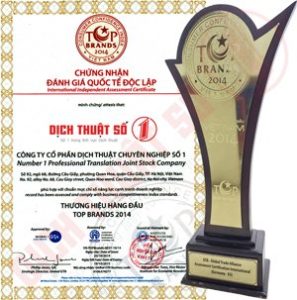Latin (Latin) is an ancient language that has been lost in history but still plays an important role in the modern world. From majestic Roman architecture to the legal system and scientific terminology, Latin has left a deep mark on many fields.
The following article by No.1 Translation not only learning about the Latin language, but also a journey of discovering history, decoding how to learn Latin and the needs Latin translation Currently.
Overview of Latin
Latin (Lingua Latīna) was the official language of the ancient Roman Empire. Literally, Latin comes from the name of the Latin tribe, who lived in the Latium region (now Lazio, Italy) - where this language developed. In a broad sense, Latin is a language that has had a profound influence on Western history, culture, language and scholarship. It is the origin of many modern European languages and plays an important role in many fields. So when was Latin used in Vietnam?
Latin is not widely used in Vietnam. However, it can be found in some fields such as academic research, medicine, religion and education.

History of Latin
Latin is a member of the large Italic language family. The Latin alphabet, which emerged from the old Italic alphabet, is itself derived from Greek and Phoenician writing. Latin historically comes from the prehistoric language of the region of Latium, specifically around the Tiber River, where Roman civilization was formed. “How and when was Latin spoken by the Romans?” has long been a controversial question. Latin’s influence on Celtic, the dialects of northern Italy, the non-Indo-European languages of Etruscan in central Italy, and Greek in southern Italy has been detected, but the influence on native Latin remains uncertain.
The history of Latin is divided into several periods, each of which represents changes in vocabulary, usage, spelling, morphology, syntax, etc. These include:
- Ancient Latin
- Classical Latin
- Vulgar Latin
- Medieval Latin
- Renaissance Latin
- Early Modern Latin
- Modern Latin

The history of Latin is divided into several periods.
What country is Latin from?
Latin originated in Italy and was the official language of the Roman Empire, spreading throughout Europe, North Africa, and parts of the Middle East. Latin's influence is still present in Romance languages such as Italian, French, Spanish, Portuguese and RomanianHowever, Latin is not the official language of any country today.
Is Latin a dead language?
Latin is considered a “dead language”. This means that it is no longer used as a language of everyday communication in any community, there are no native speakers of Latin, and it no longer develops or changes over time like living languages.
However, a dead language does not mean it is no longer valuable. Latin still plays an important role and influences the modern world in many ways.
Is Latin difficult to learn?
Learning Latin is considered more difficult than learning modern languages such as English, French or Spanish, especially for beginners. However, the level of difficulty depends on many factors such as language background, learning method and personal motivation.
Factors that create challenges:
- Complex Grammar: Latin is an inflectional language with 7 grammatical cases, 3 genders, and a rich verb system with many tenses and aspects. Mastering the grammar requires perseverance and practice.
- Vocabulary:Although Latin is the source of much English vocabulary and other Romance languages, there is still much unique vocabulary to learn.
- No native speakers: There is no native speaking community to practice speaking with, which can make learning Latin more difficult.

Latin alphabet and pronunciation
The Classical Latin alphabet has 23 letters. It is similar to the modern English alphabet, but there are some minor differences. Here is the Latin alphabet and its basic pronunciation:
| Alphabet | Name | Pronunciation (IPA) |
| A a | a | /aː/ |
| B b | be | /b/ |
| C c | cē | /k/ |
| D d | de | /d/ |
| E e | ē | /eː/ |
| F f | ef | /f/ |
| G g | gē | /ɡ/ |
| H h | ha | /h/ |
| i i | i | /iː/ |
| K k | ka | /k/ |
| L l | el | /l/ |
| M m | me | /m/ |
| N n | en | /n/ |
| O o | ō | /oː/ |
| P p | pē | /p/ |
| Q q | kū | /kʷ/ |
| R r | er | /r/ |
| S s | es | /S/ |
| T t | tē | /t/ |
| U u | ū | /uː/ |
| V v | ū | /w/ |
| X x | ex | /ks/ |
| Y y | ȳ | /yː/ |
| Z z | zeta | /z/ |
How to learn Latin for beginners
Books – Latin learning materials
Learning Latin on your own requires persistence and discipline, but it is entirely possible with the help of the right books and study materials. Here are some ways to get started:
- Learn from Latin books: Wheelock's Latin, Latin for the New Millennium, Lingua Latina per se Illustrata…
- Online Latin learning materials: Latinitium, Learn Latin, The National Latin Exam…
Latin Dictionary
Some Latin dictionaries you can refer to are: Oxford Latin Dictionary, Cassell's Latin Dictionary...
Latin translation software
Some free and fast Latin translation software include:
- Google Translate: This Latin translation application allows Google to translate Latin to Vietnamese and other languages quickly with high accuracy.
- Latin English Translator App: Latin translation app recommended by Google Play.
- Lingvanex: Free online Vietnamese to Latin translator.
How to translate names into Latin
There are no set rules or direct tools for translating names into Latin. However, there are some methods and guidelines you can refer to:
Find direct equivalents
- Latin/Greek Names: Some modern names are directly derived from Latin or Greek, such as Julius, Marcus, Sophia, Helena. In this case, you can keep the original name.
- Saint Names: Many Saint names have Latin versions, for example: John (Johannes), Peter (Petrus), Mary (Maria). You can look up the Saint name that corresponds to your name.
Phonetic transcription
Convert the sounds of your name to Latin letters: This is the most common method. You need to find Latin letters that have similar pronunciation to the sounds in your name.
Translation
Find out what your name means: If your name has a specific meaning, you can look up the Latin word that corresponds to that meaning. For example, the name “Flower” can be translated as “Flora” (the Roman goddess of flowers).
Use support tools:
- Latin-English/English-Latin Dictionary: Look up Latin words that correspond to the sounds or meanings in your name.
- Latin Websites and Forums: Find help from a community of Latin learners and users.
Note: No Latin translation of the name is completely accurate.
Current Latin translation needs
With its long history and significance, the need for Latin translation is increasingly attracting more and more attention. To meet that need, Translation Number 1 provides professional, high-quality Latin translation services for individuals, businesses and organizations. We provide the following services: Translate Latin to Vietnamese, Specialized translation services, Interpretation, Make subtitles video, Book translation from Latin – Vietnamese… Contact Contact us now for free consultation and quote!
>>> See more:






